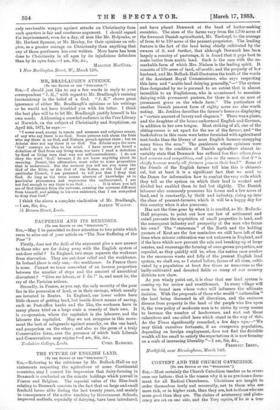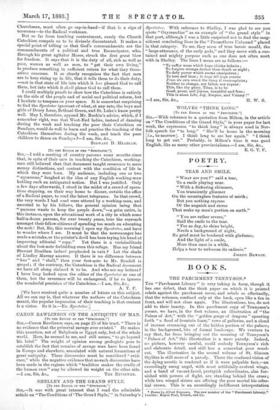CONTENT AND THE CHURCH CATECHISM. [To TEE EDITOR OF THE
"SPECTATOR."]
SIR,—Most certainly the Church Catechism teaches us to rever- ence our betters : that is the reason why it is so precious a docu- ment for all Radical Churchmen. Christians are taught to order themselves lowly and reverently, not to those who are more rich, or in higher rank, than they are, but to those who are more good than they are. The clairas of aristocracy and pluto- cracy are set on one side, and the Tory squire, if he is a true Churchman, must often go cap-in-hand—if that is a sign of reverence—to the Radical workman.
But so far from teaching contentment, surely the Church Catechism compels us to be divinely discontented. It makes a special point of telling us that God's commandments are the commandments of a political and true Emancipator, who, through his great agitator Moses, struck the first great blow for freedom. It says that it is the duty of all, rich as well as poor, women as well as men, to "get their own living," to produce something in sufficient return for what they them- selves consume. It so clearly recognises the fact that men are to keep rising up in life, that it tells them to do their duty, —not in that state of life into which it has pleased God to call them, but into which it shall please God to call them.
I could multiply proofs to show how the Catechism is entirely on the side of the people and of social and political reform, but I hesitate to trespass on your space. It is somewhat surprising to find the Spectator ignorant of what, at any rate, the boys and girls of Drury Lane, Bethnal Green, and St. Luke's know pretty well. May I, therefore, append Mr. Ruskin's advice, which, if I remember right, was that West-End ladies, instead of dancing -during the week and teaching the poor their Catechism on Sundays, would do well to learn and practise the teaching of the Catechism themselves during the week, and teach the poor children to dance on Sundays P—I am, Sir, &c.,.
STEWART D. IfEkina.m.



































 Previous page
Previous page